 |
| Photo from http://flexiinfo.com/images/info.jpg |
Information today has been so mixed up (or messed up) because of different channels for information such as academic researches indexed by other researches, encyclopedias, and Internet itself. However, some institutions still value the essence of originality of thought, or creating new knowledge directly from the mind, without depending on external sources, when it comes to gathering and sharing knowledge. If external sources were used as basis for your contribution to the body of knowledge, then it is just to give the owner his or her proper credit. Or else, the issue of plagiarism comes in.
Not just because I am about to discuss plagiarism here doesn't mean we will revolve around the meaning, effects, morality issues, etc. What I will discuss here is the nature of plagiarism and some counter-arguments on plagiarism, which I think can be a debatable issue.
Nature of Plagiarism
 |
A professor in my university once said, "60% only of the stuff in the Internet are true."
Photo from http://www.plagiarismchecker.net/wp-content/uploads/2012/02/plagiarism.gif |
Purdue Online Writing Lab indicates that
"...plagiarism, which is the uncredited use (both intentional and unintentional) of somebody else's words or ideas." I can only think of getting into detailed parts of each word to understand the nature of plagiarism itself. But for now, we focus on the word
uncredited.
Uncredited: I cannot find the meaning of this word from mainstream dictionaries such as Merriam Webster; although we can actually slice it to 2 parts (un + credited). The prefix
un- means
not-. Therefore, when it is joined to a word, for example, credited, it means
not credited. Credited, on the other hand, means
to attribute to some person. From the definition, we could bring up another word,
attribute -
to reckon as made or originated in an indicated fashion. To reckon means
to determine by reference to a fixed basis. This may look silly, but if we try to merge all the definitions we tried to bring up (of course we can define more of the words but in my discretion, this is enough), we could end up with this new definition:
not determining by reference, as made or originated, to some person. You might be asking the point of expanding a simple definition of uncredited in this issue. Yes, the definition is simple and short to understand already. My point in expanding is to dwell on what really is plagiarism.
 |
| Photo from http://www.german-business-etiquette.com/img/5-gifts.jpg |
Crediting someone is a form of respect not just to the authors, but also to his works. An analogy here is that, taking care of your gifts means two things: liking the gift and caring for the giver's feelings. You are taking care of the gift a person gave you because you appreciate the value of the gift to you, and you value the connection between you and the giver. Therefore, uncrediting something means that it is not much valuable to you, or the connection of you and your source is not valuable at all. Giving credit to information itself gives much more value to it and it shows that you value your connection to the source.
Other words in the definition of plagiarism given by Purdue OWL are simple enough and easy to understand, so we won't dwell on those words much.
So the definition itself does not revolve only on "thanking" the source for the wonderful information you have obtained from him or her. Crediting the source of the information means that you value the source's product, and you value the source as well, for producing the product (information).
Counter-arguments on Plagiarism
I'd like to share some of the counter-arguments on plagiarism, based on my recent encounter of a case of plagiarism:
1. With so many information today, it is not impossible that two people from other sides of the world share the same idea.
-> Yes. There is a high probability that people would share the same ideas; however, each people could have different ways for interpreting or phrasing their thoughts. Since it came from their minds on their own words, each idea becomes unique to each other; hence, originality takes place. The point here is that, if you really get information from somewhere and you did not give credit to the source, then the issue on plagiarism appears. If you strongly believe that the idea is originally yours (without basing it from other sources), then the issue subsides.
2. Isn't it that the point of researching is to contribute to the general knowledge?
-> The issue may be see at that point. However, plagiarism is not exclusive to research. It exists everywhere, although it may be called something else. Researchers do not research for the sake of just throwing and bragging their discoveries. The word there is to "contribute" and we must give them proper credit to it.
Disclaimer Note
I am not an expert in this field but these are my thoughts about this issue. The issue of plagiarism might be too old already but a lot of people now seem to disregard the essence of crediting someone's work. If you have thoughts about the issue, you can share it with me as well. :)
Comments? :D




